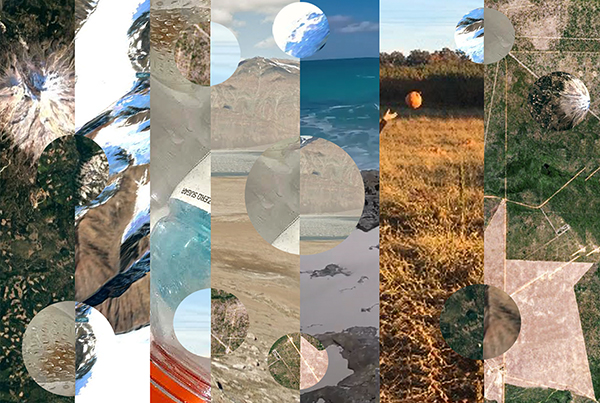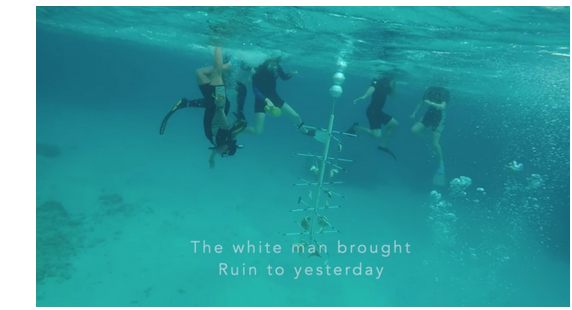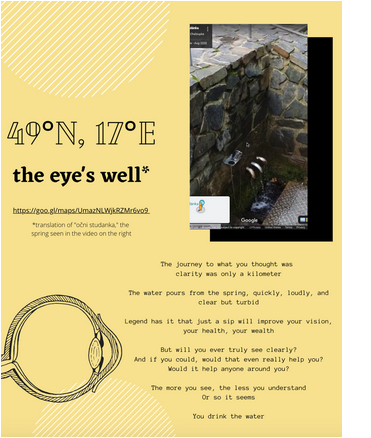Ways of Imagining Environmental Justice: Spring 2021 Student Showcase
July 20, 2021

This guest post was written by Dr Rebecca Macklin, the 2020-21 Mellon Postdoctoral Fellow with the Penn Program in Environmental Humanities. In this piece, she reflects on her experience teaching a Spring 2021 class titled Imagining Environmental Justice (an approved course on the new Environmental Humanities Minor and the Native American and Indigenous Studies Minor), and speaks to three of her students. The final project of the course culminated in a just-launched showcase of student work that we hope you will explore!
What does it mean to imagine environmental justice? From January to May 2021, I met with a dozen Penn students twice a week to consider this question. We met online, as was the new norm by then, dialling in from around the country. In the United Kingdom, I felt especially far removed, meeting my students each session across a five hour time difference. This was, in the end, quite fitting--reflective of the global, wide-ranging focus that our conversations took.
The materials that sparked our conversations consisted of a range of narratives from global contexts including the US, Canada, South Africa, the Marshall Islands, and Palestine. They highlighted a variety of forms and modes of storytelling, particularly emphasising Indigenous responses to the intersecting threats posed by colonialism, environmental degradation, and climate change.
For the final assignment, students were asked to examine a subject of their choosing through creative inquiry. The Imagining Environmental Justice Student Showcase is the result of this: a public exhibit of creative pieces that explore topics from animal ethics and food insecurity, to the complexities of belonging in settler colonial contexts.
To mark the launch of the showcase, I took the opportunity to speak with three students about their experiences. Below is my conversation with Adriana Discher, Sophia Landress and Faye Parker.
Rebecca Macklin: So to start with, I'd love to know: what made you want to take this class?
Adriana Discher: I really appreciated seeing environmental justice in the title of a class because it’s something I was introduced to outside of an academic space. And I think that's true for a lot of people; a lot of environmental justice education is very informal. I think that part of the beauty of this class is that it meshed the formal and the informal, given that it wasn't science-based. It was really looking at narratives and how to talk about environmental justice in normal settings.
Sophia Landress: I studied Anthropology; it was my major and English was my minor. And I was really struck by this intersection. It was the only class I had ever seen that was cross-listed, to have this ethnographic-like approach to research and knowledge while also examining literature, and narrative. And then also being able to find that nexus at environmental justice, which is a personal passion of mine, was a prime opportunity to learn.
Faye Parker: English and Science have always been my two favorite subjects. And I didn't really see how they overlapped until I came to Penn and I took “Water Worlds” with Simon Richter. I think it was the environmental justice aspect and the Indigenous aspect of this class that made me so interested, because I've done all this reading on how they're the most vulnerable groups, but they also in many ways understand the environment better than anyone else. So that was what drew me to this class.

RM: Thinking about the creative assignment, I know that a number of students felt that this was quite different to anything they'd done before, or at least that it was taking them outside of their comfort zone. Is this something that you found?
FP: The part that took me out of my comfort zone, I would say–I don’t know if Sophia and Adriana felt the same way–but I felt kind of vulnerable when I was sharing it, because I don't really share a lot of creative pieces. Because, when you share a research paper, a lot of the time the criticism is about your technique, and analysis, and grammar. And then sharing a poem, the criticism was coming straight at me… I was very nervous to share something that felt more part of me than a regular research paper.
AD: Yeah, that vulnerability really resonates with me. It was a totally new experience for me, given that this was my first English class at a college level. But it was an area that, after having read so many other pieces, I felt comfortable adding something to the realm of environmental justice creative works. I like that this class emphasizes both – it is about your own writing, but it also is about how you can contribute to something bigger. And that's kind of essential in my own worldview.
SL: I feel like this became a very unique intersection of personal and research in that, I've written poetry before and personal narratives, and then I feel very comfortable writing critical essays. And this is the first time I really merged those. I was writing a poem about my hometown, something that's very personal to me, a place I love dearly. And I was taking on a critical lens, which is an entirely new outlook [for me]. That felt daunting in some ways.
RM: Following on from that, did making your pieces change the way that you thought about your chosen subject? And did forcing yourself into that vulnerable place help you think about the subject differently?

SL: I would say yes. This was a very personal topic to me: my hometown and the place I grew up in. I feel very connected to the land there. Doing this research forced me to consider the complications behind the emotions I feel for place. It made me critically evaluate what it means to have that connection with that place and understand my own privilege and my own situation. I think just starting that dialogue is a critical first step.
FP: For me personally it changed a lot. I have a bunch of videos I took on a GoPro when I went on a trip to San Salvador in the Bahamas. Part of the reason I like all of these videos is that I love all the imagery of the ocean. And there was a parade at the end that we witnessed – Junkanoo, where they had all dressed up in really colourful outfits. And I was like: Oh, it's so cool. That's so fun. That's so pretty. And then as soon as I started doing the research, I realized the deep, deep level of settler colonialism that was present on that tiny island. It was quite literally where Christopher Columbus first made landfall. So many layers of colonialism had gone through that island. And as soon as I saw it, I was like, wow, I was really ignorant while I was there. So since I started doing that my viewpoint changed completely.
AD: I don't know how well my project lends itself to this question. I tried to bring in multiple short stories and a poem or two to explore different themes because I wanted to have this global perspective in my piece. The global perspective of my work was intentional, in the sense that it's something that I had before I took this class and I wanted to translate into this class.
RM: I know some of you have graduated or started jobs since class finished, some are still studying. Will you continue to think about any of the issues that we focused on in class, whether in your jobs, or studies, or activism?
FP: I’m a part of the PPEH internship this summer, so I'm obviously still thinking about it. I'm excited about being involved in Penn Students for Environmental Equity (SEE), and how that’s bringing different types of environmental education to school systems in West Philly. One of the really cool things that recently got done is they finally got planning permission to make a garden at the middle school I work with, and that garden is a first step to disrupting the food deserts in that community.
RM: That's fantastic. Adriana and Sophia, did you want to add anything?
SL: Yeah, I was waiting on edge to hear what Faye was gonna say about the project they implemented, because I'm thinking about how this school I'm working in can take on more environmental, food-conscious approaches, as well as thinking about the histories of what we're consuming and how we teach certain lessons. Like, how can we have an outdoor space so that [the students] can be outside during free time, or have access to green space? That’s something I'm curious to learn about and make more of an option for students in cities.
AD: There's always going to be a way for this class to connect to public health, in my mind. I think something super valuable from this class is how you can take a topic so big as environmental justice and be able to focus on and value individual narratives that aren't often told. You need these stories to explore what public health and a “healthy lifestyle” or “sustainable lifestyle” really means.
FP: One other thing that I loved about this class and will take away is that it provided me with ways to communicate about climate change and environmental justice in ways that aren’t just a research paper or straight-up data. It showed me different ways people can connect, whether it's through a poem, a book, or a film... Being able to communicate something across many mediums, depending on what medium connects with different people, is so powerful.
This interview has been edited for publication.
Rebecca Macklin is the 2020-21 Mellon Postdoctoral Fellow with the Penn Program in Environmental Humanities. Her research is focused on Indigenous cultural engagements with environmental justice and resource extraction. She gained her PhD from the University of Leeds in 2020 and is currently writing a monograph entitled Unsettling Fictions: Relationality and Resistance in Native American and South African Literatures.
